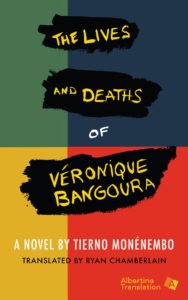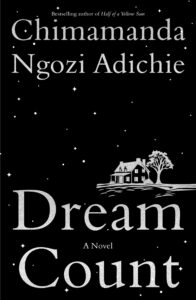The sound of the sea, of waves crashing gently against the sand, introduces the second track in Wana Udobang’s poetry album Transcendence. “Things You Learn When Your Father leaves” then launches into the different ways the body remembers grief as Wana invokes the near-silent quality of certain memories, the lucidity of its poetry which slowly clouds with time, marked by experience. She makes an interesting metaphor for roads and cars, flexing her skill as a narrator:
You will always remember your mother’s anxiety before your first driver’s license;
there were days she drove far enough to take a break from your father’s raging fists. . .
Your mother never fails to remind you that your car isn’t just this metal box with wheels you learn to plough through a road;
she says driving is how women run from their death to keep their children alive.
Verses like these are why Transcendence is a fulfilling work: the emotional honesty is never compromised even as sonic flourishes amplify the tone of each track; most of them urgent, some reminiscent.
Contemporary Nigerian poets are ambitious in how they evoke identity and gender politics. Udobang has a similar gaze in her work. Twice, pictures of her have gone viral, championing a discourse on fat-phobia. The photo of her by Lakin Ogunbanwo was accompanied by her poetry; stripped to nothing, she bares her body, stretch marks and all.
While mainstream representation of otherwise marginalized people is often considered political and brave, Wana, in a CNN piece, rejected the offers of heroism. “Posting a photo of myself wearing a bathing suit automatically throws my body—and all of me—into a ‘political’ position,” she writes. “It’s seen as me making a statement. But it also denies me the privilege of simply being vain, self-indulgent or just showing off my beach body, as smaller women might do.” The subsequent requests she received to speak on body politics, she pointed out, continued the trend of seeing her through the scope of how she looks.
Like her previous spoken word and poetry albums, Dirty Laundry (2013) and In Memory of Forgetting (2017), Transcendence is a feminist work, but it is the flair of the storytelling, and not ideology, that makes the album tick. If the title “Transcendence” betrays thoughts of lights and godlike ascension, it’s because each piece sheds the skin of the woman you might know and paints a clearer, complex picture, and, eventually, a more rewarding work of art. That focus, though, sometimes leans into self-indulgence.
There’s a progression gleaned from the track list, from childhood to adulthood, each marked by the dominant emotion of the time. For the former, it’s the pain of traumatic experiences; a father’s stinging palm takes the words from a mother’s quivering lips, makes the narrator of the opening piece “Family Portrait” so invested that you taste the bitterness:
As children we learnt very quickly to choose pain over disgrace/
so my brother would throw his comic book to the side, muzzle my mouth shut as the words ‘leave my mummy alone’ would eat through the spaces between his fingers
They said our parents were going through a midlife crisis.
Udobang draws from being a girl in a misogynistic society as Nigeria. Through depictions of her mother surrendering to the men in her life, she forges a better alternative for herself and women worldwide.
On how she investigates memories and places them in a larger context, two pieces—“Girlhood” and “Conversations with Your Mother”—are most relevant. On the former, she explores abuse, the historical bleeding into the personal, a nuanced look at how the body remembers hurt and, in time, craves it. A sharp distinction between the phases of girlhood and womanhood is drawn.
On “Conversations,” the hurt is bare in the first lines—“Your mother says you are spilling with guts”—and she skillfully retains the double entendre —of courage and of the body’s mechanism—throughout the poem. This mother’s voice is “thickened with anger” because the daughter has read books and knows to pursue her own ideals. A woman finding purpose through marriage and eventually motherhood is etched in the culture of many peoples (especially in Africa) and Udobang displaces the idealism, exposing the danger it poses to the woman’s autonomy.
Udobang discovers herself gradually, so that, from “Confidence” to “Revolution,” we get six pieces of positivity, of sisterhood and white soups, of reclaiming all that’s been taken from the woman, of making immortal the beautiful moments when men love her with the lights on; no shame, no fat shaming, just love between man and woman; pure, intentional love.
“Sister Circle” is a personal favorite; the importance of a community, of friends who love and will do everything to see you rise from the ashes of hurt, is depicted in such loving verses.
These poems wouldn’t sound as good without the accompanying music, the stirring synths and softly knocking percussions. Udobang, whose portfolio includes documentary productions like Sensitive Skin and Living in Lagos, has the experience of visual scoring. Some poems are set to languid music, warm and expansive. “Shylock,” my favorite production on the album, features a hypnotic bass line and a sparse touch of the shekere. The Hip Hop influence is bare: this is music you could play at a protest. “White Soup,” the ode to cooking which quickly becomes a metaphor for unhinged joy, is scored by a dramatic interpretation of palm wine music, a contemporary offshoot of Highlife popularized in the mainstream through discourse about beer parlors (and generally fun spaces) and the sociopolitical commentary they’re known to inspire.
The achievement of Transcendence rests in its gaze: more women will emerge from sad girls and more lights will shine on them. It introduces a world of infinite possibilities. A world in which girls unlearn patriarchy-sanctioned respectability and become real, independent women, and not martyrs. This album, through constructive work, leaves its statement visible for anyone who clicks play. You should click play.
LISTEN TO TRANSCENDENCE BY WANA UDOBANG HERE.
More Reviews from Open Country Mag:
—The Geez by Nii Ayikwei Parkes Review—Threading Family, Love, & Race
—20.35 Africa Vol. III Review—The Pain Won’t Go Away
—Waterman by Echezonachukwu Nduka Review—A Sobering Stare at the World
—Sacrament of Bodies by Romeo Oriogun Review—An Originative Work by an Epochal Poet
—The Origin of Name by Adedayo Agarau Review—Narrating Grief
—Nsukka Is Burning Review—How a Small University Town Influenced Nigerian Literature






4 Responses
Wow!..💯
Oh my. Emmanuel, you painted this.
This is the first time I’m meeting Wana, and (thanks to a review that literally takes your breath away) I love her already. I’ll download and listen.
Thank you so much for this beautiful gift.